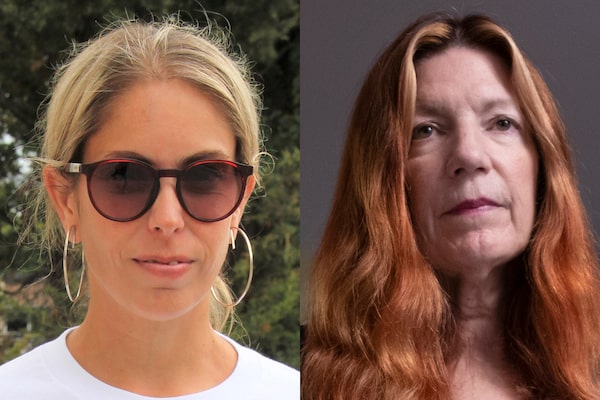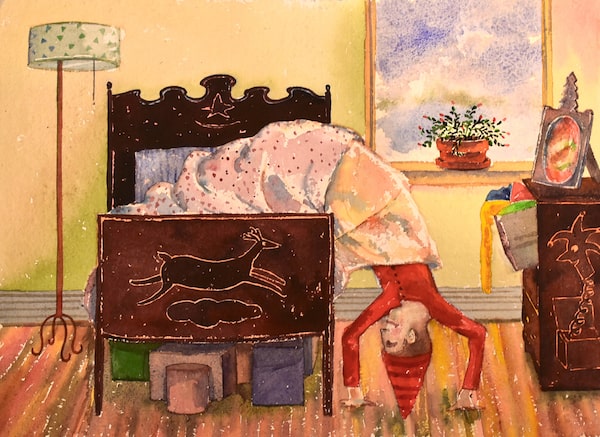Good morning, and welcome to the weekend.
Grab your cup of coffee or tea, and sit down with a selection of this week’s great reads from The Globe and Mail. In this issue, Grant Robertson unravels the story of a mysterious wallet that suddenly reappeared 50 years after it went missing, with a letter containing what appears to be the dying wish of the man who stole it.
Certain stories are too compelling to resist, and curiosity got the best of Robertson this fall when a strange brown wallet arrived in an envelope at The Globe and Mail. It was said to belong to a former NHL player, and the man who sent it provided few clues about who he was – only that he was running out of time and wanted to make amends for a decision he made in 1973 as a troubled 16-year-old. So began the saga of the wallet, which takes readers on the trail for answers from Kincardine, Ont., to New Haven, Conn., and beyond.
“Based on what few details we had, it was clear there was a real darkness to this story,” Robertson says. “It also had the potential to be extremely uplifting. We knew that if we could get the wallet back to the owner, pieces of the mystery would fall into place, and there might be a chance to rewrite both ends of this story in real time. But I think I underestimated just how far down the rabbit hole we would ultimately go.”
In Windsor, which is the location of a Globe and Mail pop-up bureau launching this weekend, business reporter Jason Kirby finds opportunity knocking for the southwestern Ontario city of about 230,000. Construction has begun on the $5-billion NextStar Energy EV battery plant, while a second bridge spanning the Detroit River will open next year bearing the name of hockey legend Gordie Howe. More than $16-billion will flow into the region over just the next few years, but with investment dollars come questions about accommodating newcomers, downtown revitalization, and harnessing economic success for the long term.
In the 2023 edition of the Globe 100, editors and reviewers offer up our annual guide to the best fiction, non-fiction, thrillers, graphic novels, picture books and cookbooks of the year.
If you’re reading this on the web, or it was forwarded to you from someone else, you can sign up for Great Reads and more than 20 other Globe newsletters on our newsletter sign-up page. If you have questions or feedback, drop us a line at greatreads@globeandmail.com.
Hank Nowak holds his wallet that was lost with his I.D. cards and a photo of his father, at the McCormick rink in Toronto, Dec. 1, 2023.Christopher Katsarov/The Globe and Mail
When Hank Nowak first heard that his wallet, which went missing 50 years ago in New Haven, Conn., had been mailed to Toronto this fall, he asked whether the money was still inside. It wasn’t, but what was contained in the former NHLer’s mouldy-smelling brown leather trifold was a story waiting to be told, one of family, identity, regret and forgiveness. Grant Robertson reveals the mystery.
Still bearing scars of recessions past, Windsor is on the verge of a billion-dollar revitalization
Construction of the Gordie Howe International Bridge, which will connect Windsor, Ont., to Detroit and serve as an alternative to the congested Ambassador Bridge nearby.Fred Lum/The Globe and Mail
Windsor, Ont., has long been accustomed to booms and busts – not only as a hub of the volatile auto manufacturing sector, but as the geographic centre where Canadian and American economic interests play out. But a transition is afoot, and it has the local population hoping Windsor can become more resilient as it welcomes an outsize share of investments in Ontario. In the first dispatch from our new pop-up bureau, Jason Kirby interviewed people who represent every facet of that transition – small business owners, housing advocates, property developers, union leaders, corporate leaders in the manufacturing sector, entrepreneurs and newcomers – to take a snapshot of a city on the edge of a critical shift. Read the feature story.
Two caring doctors, a deep divide

Addiction doctors Andrea Sereda, left, and Sharon Koivu both serve patients in London, Ont.The Globe and Mail
In the current drug crisis plaguing this country, the high stakes ensure that passionate people are involved in the search for solutions. In London, Ont., two of those voices are addiction doctors whose divergent approaches to saving lives provide a stark example of how the debate is playing out. On one side is Dr. Andrea Sereda, who advocates for a safer-supply approach. On the other: Dr. Sereda’s one-time mentor, Dr. Sharon Koivu, who is vehement that safer supply is a mistake that only deepens addiction and the health risks that go with it. Marcus Gee reports.
The Globe 100: The best books of 2023
Christie Vuong/The Globe and Mail
An annual tradition continues: Presenting the Globe 100 for 2023 – the most remarkable reads of the year selected by Globe editors and writers. Choose from an array of categories, including international and Canadian fiction and non-fiction, cookbooks and thrillers, then get lost in the pages of these enrapturing books. Proceed to the full list.
Kibret Getahun, a farmer on the outskirts of Addis Ababa, says he was forced to abandon a large portion of his land, with little compensation, to make room for a massive construction project that will include a palace for Ethiopian Prime Minister Abiy Ahmed.The Globe and Mail
Years of war and drought have left millions of Ethiopians in need of emergency food aid, but while the government is seeking help from the international community, a multibillion-dollar construction project that would reportedly include a palace and luxury villas for Prime Minister Abiy Ahmed and his top officials has angered many in the country. The government has said the project will be funded by international and domestic donors, but the funding is shrouded in secrecy. Our Africa bureau chief, Geoffrey York, heard from several residents who said they were evicted and forced to give up their ancestral farms without adequate compensation to make room for the project. Read the full article.
They own horses, don’t they? On animal rights and a complicated creature

Icelandic horses rest on a straw bed at a stud farm in Wehrheim, Germany, near Frankfurt, on Dec. 1, 2023.Michael Probst/The Associated Press
Many domestic animals – cats and dogs, especially – have settled into tidy niches in human society that have eluded horses. To humans, horses can be labourers, Olympic athletes, therapeutic or educational aids – even meat. But the singular history of the relationship between horses and humans is evolving in new ways, leaving us to seriously ponder what we consider ethical treatment of these fabled beasts. This century, writes Li Robbins, has seen notable advancements in understanding the fundamental needs of horses – albeit an understanding slow to translate into their daily lives.

Supplied
Each year, The Globe’s Susan Krashinsky Robertson participates in her family’s unique holiday tradition: the Great Menorah Race (the premise: the last one to burn out wins), which was conceived many years ago, possibly to get the kids to stay at the table. Likewise, far beyond the usual latke-making or Christmas tree-trimming activities, families across Canada have their own rituals. Robertson reached out to many of them to learn about their creative inventions to make the holidays more fun, more meaningful, or even just kookier. Read the full story.
Finally, take this week’s arts quiz to test your knowledge of arts and culture news.
Sample question: The National Ballet of Canada’s annual production of The Nutcracker opens on Dec. 8. How many young performers (dancers who are not part of the NBC’s professional company) perform in the production?